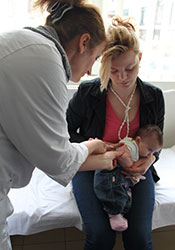European Immunization Week 2012 in review

WHO
In 2012, all 53 Member States in the WHO European Region took part in European Immunization Week (EIW), a milestone in the initiative’s seven-year history. Such widespread support is particularly critical for the Region as Member States work to eliminate measles and rubella by 2015 and to maintain Europe’s polio-free status. The vital role of health workers, as the most trusted source of information about vaccines, was also in focus.
Further, 2012 marked the first time that all WHO regions joined together for a World Immunization Week, giving a global perspective to the initiative.
Regional communications
WHO/Europe defined key messages and encouraged participating countries to focus on them during EIW 2012, adapting them to national needs and situations. One of these highlighted the vital role played by front-line health workers in national immunization programmes and the importance of providing support to enable them to be strong advocates for immunization.
This support includes the online Immunization Resource Centre, which was established by WHO/Europe and includes job aids for health workers to use when discussing vaccination with their patients. Additional tools will be added to the Resource Centre. WHO/Europe also produced a short film, in which health workers from around the Region described how they discuss vaccine issues with parents.
Once again, EIW received a tremendous level of media coverage throughout the Region, with more than 400 instances of coverage in print, online and broadcast media. For example, the article “The urgent need to immunize older age groups”, co-written by Zsuzsanna Jakab, WHO Regional Director for Europe and Else Smith, Director-General of the Danish Health and Medicines Authority, emphasized the continued need to control measles outbreaks and prevent further cases, another key WHO/Europe message for EIW 2012. In addition, information on EIW was featured nearly 250 times on the web sites of health ministries, public health institutes and other organizations.
Social media
A diverse group of partner organizations supported social-media activities for EIW 2012 by contributing to the “Week of Guest Bloggers” on the campaign web site. Bloggers included representatives of the GAVI Alliance, the Bill & Melinda Gates Foundation, the Measles & Rubella Initiative, Shot@Life, the European Centre for Disease Prevention and Control (ECDC), the United Nations Children's Fund (UNICEF) and the European Confederation of Primary Care Paediatricians; and other European immunization experts. The campaign site was active throughout and beyond 21–27 April, with members posting pictures, writing blog posts, announcing events and making comments.
WHO/Europe hosted a live Twitter chat during EIW 2012, using the hashtag #immunizeEurope, enabling immunization experts and the public to engage in an open conversation about vaccine issues. There were nearly 500 tweets containing the hashtag between 3 April and 2 May.
Another new initiative was a live question-and-answer session, in which more than 30 participants discussed ways to build confidence in vaccines, and shared experience and lessons learned from EIW 2012.
Partner support and activities
As in years past, partner organizations both provided important support during EIW 2012 and coordinated their own activities. ECDC convened a “Free Thinkers for Measles Elimination” meeting that brought together experts from a wide array of fields to generate new and innovative ideas for promoting measles vaccination in Europe.
UNICEF promoted the EIW messages about front-line health workers, and produced a video in which a focus group of health workers from Armenia discussed the challenges they faced in vaccinating patients.
Her Royal Highness Crown Princess Mary of Denmark, Patron of WHO/Europe, once again provided a statement of support for EIW, encouraging all countries in the Region to continue their efforts to raise awareness and to work towards the Region’s goals, such as sustaining its polio-free status and eliminating measles and rubella by 2015.



